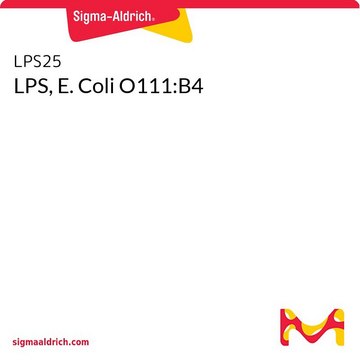SMB00704
Lipopolysaccharides from Proteus mirabilis
purified by phenol extraction
Synonyme(s) :
LPS
About This Item
Produits recommandés
Source biologique
bacterial (Proteus mirabilis)
Niveau de qualité
Forme
lyophilized powder
Produit purifié par
phenol extraction
Impuretés
<3.00% protein (Lowry-TCA)
Couleur
white to faint yellow
Solubilité
water: 0.90-1.10 mg/mL, slightly hazy to hazy, colorless to light yellow
Conditions d'expédition
ambient
Température de stockage
2-8°C
Description générale
Proteus mirabilis is a Gram-negative facultative anaerobic rod-shaped bacterium. Bacteria of the genus Proteus of the family Enterobacteriaceae are opportunistic human pathogens responsible for wound and burn infections as well as skin, eye, ear, nose, throat, urinary tract, and gastrointestinal infections and bacteremias.
Application
- Lipopolysaccharide structure modulates cationic biocide susceptibility and crystalline biofilm formation in Proteus mirabilis.: The study explores how variations in lipopolysaccharide structure affect the susceptibility of Proteus mirabilis to biocides and its ability to form crystalline biofilms, informing strategies to combat biofilm-associated infections (Clarke et al., 2023).
Actions biochimiques/physiologiques
Notes préparatoires
Autres remarques
Produit(s) apparenté(s)
Code de la classe de stockage
11 - Combustible Solids
Classe de danger pour l'eau (WGK)
WGK 3
Point d'éclair (°F)
Not applicable
Point d'éclair (°C)
Not applicable
Certificats d'analyse (COA)
Recherchez un Certificats d'analyse (COA) en saisissant le numéro de lot du produit. Les numéros de lot figurent sur l'étiquette du produit après les mots "Lot" ou "Batch".
Déjà en possession de ce produit ?
Retrouvez la documentation relative aux produits que vous avez récemment achetés dans la Bibliothèque de documents.
Les clients ont également consulté
Notre équipe de scientifiques dispose d'une expérience dans tous les secteurs de la recherche, notamment en sciences de la vie, science des matériaux, synthèse chimique, chromatographie, analyse et dans de nombreux autres domaines..
Contacter notre Service technique


